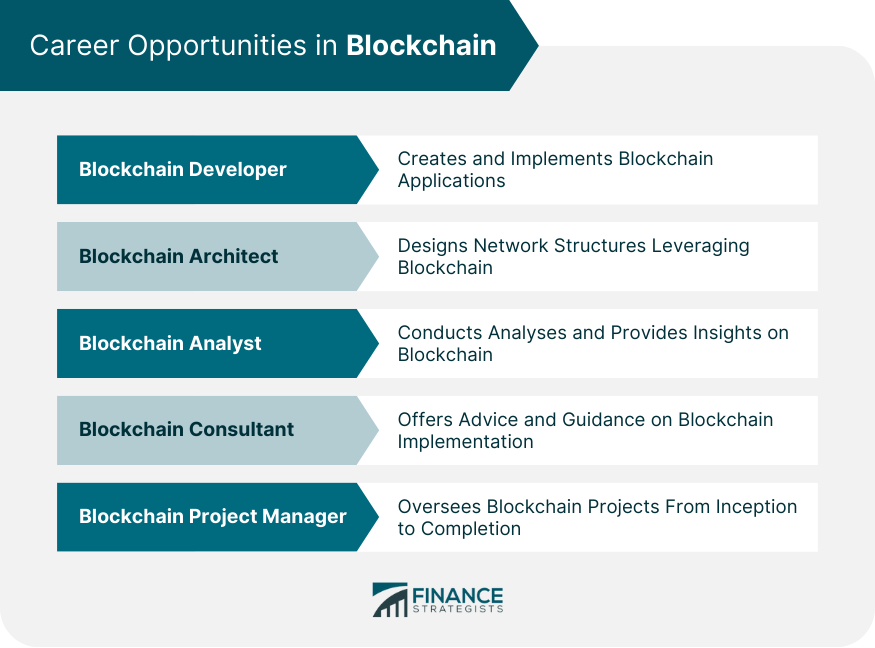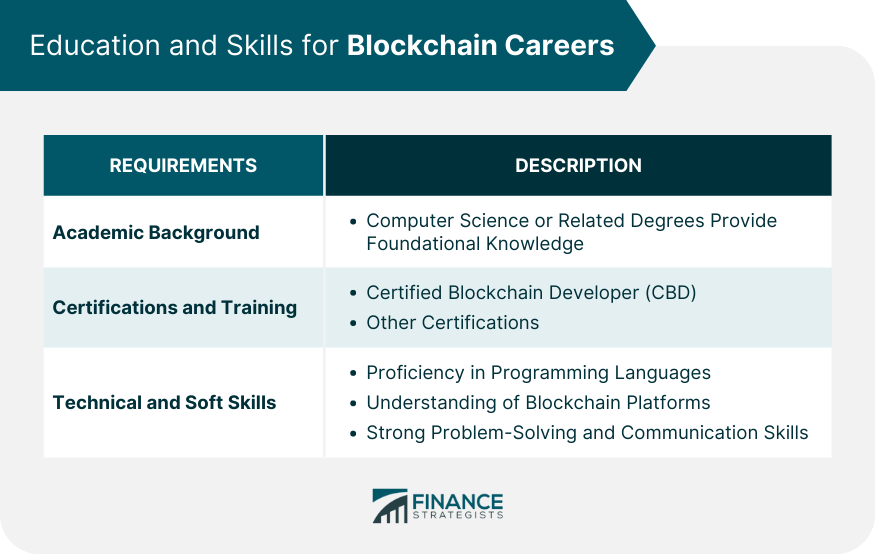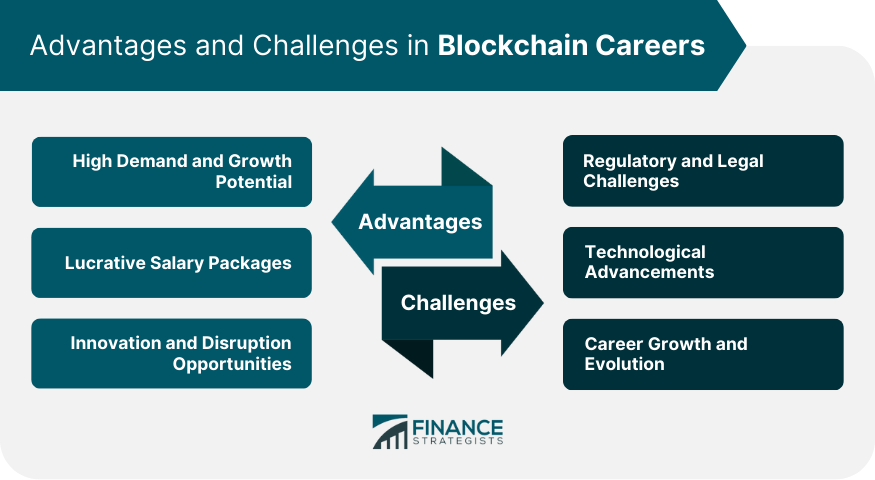Blockchain operates on a distributed, decentralized network, creating a secure, transparent, and immutable ledger of transactions. It is this inherent security and transparency that makes it an attractive proposition for industries like finance, healthcare, logistics, and even the public sector. Beyond Bitcoin, blockchain technology has given birth to a whole ecosystem of applications, platforms, and protocols. The rapid proliferation of blockchain applications and the increasing adoption of blockchain by businesses has led to skyrocketing demand for blockchain professionals. Blockchain has topped the list of most in-demand hard skills for the past two years. This high demand, combined with a scarcity of qualified professionals, has created a wealth of opportunities in the blockchain sector. As more companies recognize blockchain's potential to revolutionize traditional business processes, they're investing heavily in blockchain initiatives, necessitating the need for experts who can navigate this rapidly evolving field. Blockchain developers are responsible for creating and implementing blockchain applications. This role involves using blockchain protocols and coding languages to design the architecture of blockchain systems, create smart contracts, and develop decentralized applications (dApps). In addition to these technical tasks, blockchain developers may also need to communicate with clients and team members to identify business needs and develop appropriate blockchain solutions. Blockchain developers should have a strong understanding of blockchain principles and a high degree of proficiency in programming languages such as JavaScript, Solidity, and Python. A blockchain architect's role involves designing the entire network and system structures that leverage blockchain technology. They are responsible for creating the blockchain network blueprint, defining the blockchain protocol, and designing the consensus protocol and security patterns of the system. Blockchain architects work closely with IT teams and business stakeholders to ensure the designed system aligns with business needs and technological capabilities. They should possess strong analytical, design, and problem-solving skills, coupled with in-depth knowledge of blockchain platforms and protocols. Blockchain analysts conduct in-depth analyses of blockchain technologies, market trends, competitive landscapes, and business scenarios. Their role involves interpreting complex data related to blockchain transactions, analyzing blockchain market trends, and providing insights to help inform strategic business decisions. A solid background in data analysis, statistical methods and familiarity with blockchain technologies and cryptocurrency markets are crucial for this role. Strong communication skills are also necessary, as blockchain analysts often present their findings to non-technical stakeholders. Blockchain consultants offer advice on the implementation and use of blockchain technology to optimize business processes, improve security, and increase efficiency. They identify opportunities for blockchain integration, develop strategic plans for blockchain adoption, and guide clients through the implementation process. In this role, deep knowledge of blockchain technology is essential, as well as a strong understanding of business operations in the industry in which they're consulting. Blockchain consultants must also have excellent communication and interpersonal skills, as they must effectively communicate complex blockchain concepts to diverse stakeholders. Blockchain project managers oversee the execution of blockchain projects from inception to completion. They coordinate with various stakeholders, including developers, architects, consultants, and business teams, to ensure the project is progressing as planned. Strong leadership, communication, and project management skills are essential in this role. Familiarity with blockchain technology, as well as understanding how it can be applied to achieve business objectives, is also crucial for a blockchain project manager. While blockchain is a field that values skills and practical experience, a strong academic background can lay the foundation for a career in blockchain. Degree programs in computer science, information systems, or related fields can provide the necessary technical knowledge. Additionally, several universities and educational institutions offer blockchain-specific courses or degrees covering topics like blockchain fundamentals, cryptography, smart contracts, and dApps. These specialized programs can be beneficial for those specifically aiming for a career in blockchain. Professional certifications and training courses can help prospective blockchain professionals develop the specialized skills needed in this field. Certifications like the Certified Blockchain Developer (CBD), Certified Blockchain Solution Architect (CBSA), and Certified Blockchain Professional (CBP) can enhance credibility and demonstrate competence in blockchain technology. Online platforms offer a wealth of training courses in blockchain technology, covering a range of topics from blockchain basics to more advanced concepts like smart contract development and blockchain architecture design. These courses often provide hands-on experience with building blockchain applications, making them a valuable resource for skill development. In addition to academic qualifications and certifications, certain technical and soft skills are crucial for a career in blockchain. On the technical side, proficiency in programming languages (JavaScript, Solidity, Python), understanding blockchain platforms (Ethereum, Hyperledger, etc.), and knowledge of data structures, cryptography, and algorithms are essential. On the soft skills side, problem-solving, analytical thinking, creativity, and adaptability are key in navigating the challenges of the blockchain field. Additionally, strong communication skills are important for collaborating with team members and explaining complex blockchain concepts to non-technical stakeholders. The demand for blockchain professionals has seen a steep rise with the increased adoption of blockchain technology in various industries. This high demand, coupled with a scarcity of skilled professionals, creates a wealth of opportunities for career growth in this field. Blockchain is still a relatively new field, which means that those who enter it now can become part of shaping its future. This opportunity for growth and the chance to work on cutting-edge technology can make a career in blockchain both exciting and rewarding. Due to the high demand and specialized skills required, careers in blockchain tend to come with attractive salary packages. Blockchain engineers earn an average salary of $81,000 to $128,000 per year in the US. Even at the entry-level, blockchain positions often command higher salaries compared to other tech fields. Working in blockchain offers the opportunity to be at the forefront of technological innovation and disruption. Blockchain professionals play a pivotal role in creating solutions that can transform traditional business models, streamline processes, and increase transparency and security. This not only provides intellectual stimulation but also the satisfaction of contributing to transformative changes across industries. Given blockchain's potential to impact various sectors, the scope for innovation in this field is vast. As a disruptive technology, blockchain often finds itself at the intersection of technological innovation and regulatory constraints. These regulatory challenges can impact the adoption of blockchain technology and, by extension, the career prospects in this field. Furthermore, legal challenges related to data privacy, contract enforcement, and cross-border transactions can also pose obstacles for professionals in the blockchain sector. Staying updated on the regulatory landscape and adapting to legal changes becomes a crucial part of working in blockchain. Blockchain is a rapidly evolving field, with new platforms, protocols, and use cases emerging regularly. This rapid pace of change can be both an opportunity and a challenge. While it creates opportunities for innovation and growth, it also requires professionals to constantly update their skills and knowledge to stay relevant. Given the nascent nature of the blockchain industry, traditional career paths and roles are still being defined. While this provides flexibility and the chance to create unique career paths, it can also present uncertainties related to job stability and career progression. However, as the blockchain industry matures, it is likely that more defined career paths will emerge, providing more clarity and stability for blockchain professionals. Pursuing a career in blockchain offers a wide range of job opportunities. Roles such as blockchain developer, architect, analyst, consultant, and project manager are in high demand. Blockchain developers create and implement applications, while architects design network structures. Analysts provide insights, and consultants offer expertise in implementing blockchain technology. Project managers oversee project execution. These roles require a combination of technical skills, industry knowledge, and soft skills. The demand for blockchain professionals stems from the increasing adoption of blockchain across industries. A career in blockchain allows individuals to leverage their skills and interests in a rapidly growing field. It presents exciting prospects for those passionate about blockchain's potential to revolutionize various sectors.Overview of Blockchain Technology
Career Opportunities in Blockchain
Blockchain Developer
Blockchain Architect
Blockchain Analyst
Blockchain Consultant
Blockchain Project Manager

Education and Skills Required for Blockchain Careers
Academic Background and Degree Programs
Certifications and Training
Technical and Soft Skills

Advantages of Pursuing a Career in Blockchain
High Demand and Growth Potential
Lucrative Salary Packages
Innovation and Disruption Opportunities
Challenges for Blockchain Careers
Regulatory and Legal Challenges
Technological Advancements
Career Growth and Evolution

Conclusion
Blockchain Careers FAQs
Blockchain is a decentralized, distributed ledger technology that securely records transactions across multiple computers. Its inherent security, transparency, and immutability make it a promising technology for various applications beyond its initial use in cryptocurrency.
The blockchain field offers a range of job roles, including blockchain developer, blockchain architect, blockchain analyst, blockchain consultant, and blockchain project manager.
Careers in blockchain require a combination of technical skills (programming, understanding of blockchain platforms, data structures, cryptography, and algorithms) and soft skills (problem-solving, analytical thinking, creativity, adaptability, and communication).
Careers in blockchain come with high growth potential, lucrative salary packages, and the opportunity to drive innovation and disruption.
Professionals in the blockchain sector may face regulatory and legal challenges, the need to constantly update skills due to rapid technological advancements, and uncertainties related to career growth and evolution.
True Tamplin is a published author, public speaker, CEO of UpDigital, and founder of Finance Strategists.
True is a Certified Educator in Personal Finance (CEPF®), author of The Handy Financial Ratios Guide, a member of the Society for Advancing Business Editing and Writing, contributes to his financial education site, Finance Strategists, and has spoken to various financial communities such as the CFA Institute, as well as university students like his Alma mater, Biola University, where he received a bachelor of science in business and data analytics.
To learn more about True, visit his personal website or view his author profiles on Amazon, Nasdaq and Forbes.











